With B2B content marketing, creating a great blog post that ticks all the relevant boxes is just one phase of the process.
You simply cant publish and go to bed. You must plan strategically , execute timely, and distribute aggressively.
- Make a LinkedIn post to promote your content
- Share snippets of your post on Twitter
- Drop your post link on Quora comments
Before CoSchedule: utter CHAOS.
Fast forward to today and I keep tabs on what’s in the works, what’s due, and what needs to be done.
(All thanks to a simple work organization system I boot myself for not discovering earlier.)
CoSchedule has helped streamline the bits and pieces of my marketing campaigns, cut down content development time, and shift focus to other revenue-generating aspects of my business.
And if you use it right, this is what CoSchedule can do for you.
Quick Verdict - Is CoSchedule Worth It?
Absolutely. If you could use a couple more free hours out of your workweek—as I’m sure you could—then CoSchedule is totally worth it.
CoSchedule helps you:
- Oversee your marketing projects in one calendar view
- Collaborate with your team members on important projects
- Spot lapses and make dying-minute changes
- Plan and schedule social media content
- Produce better work regardless of time zones
"What started out as a simple WordPress calendar plugin has blossomed into a robust content planning system."
—Stephen Jeske, Senior Content Strategist, MarketMuse
CoSchedule, my friend, is your permission to quit running back and forth between different apps.
(yes. close tab number, what now? 23?)
Ps: I strongly recommend you cash in on their 14-day free trial window. Unlike a lot of software products, you don’t even need to enter your credit card. If there was ever a zero-risk investment, this would be it.

What is CoSchedule and who is it for?
CoSchedule is a robust marketing software that brings ALL the moving parts of your content marketing together and displays them in a single calendar view.
I’m not alone on this.
I spoke to Alex Birkett, Co-founder of Omniscient Digital and former Senior Growth Marketing Manager at HubSpot.
He has this to say:
“I’ve found CoSchedule to be great training wheels for content marketing operations. If you run a team of more than 3 or 4 people, it can really help you get your bearings with publishing cadence, workflows, checklists, and some light automations and nudges.”
From rough drafts to clinking celebratory wine glasses at successful campaigns, CoSchedule has you covered.
Created by Todaymade in 2013, the content marketing powerhouse has since expanded to serve over 45,000 marketers. Most of them hold one or more of the following positions:
- Founder
- Head of Content
- Senior Content Strategist
- Content Manager
- Director of Marketing
- Content Editor
- Blogger
The build of CoSchedule makes you feel like a five-star team lead coordinating your members to success. Everything is systemized and responsive so you feel like you have an assistant working behind you.
Although social media scheduling is one of CoSchedule's most loved features, it offers a lot more functions than that. If you’re simply looking for an app to post content on your Instagram and Twitter, CoSchedule might be too much for you.
On the flip side, if you need something to carry out an entire content strategy, then CoSchedule might just be the best investment you make this year.
For someone who manages a lot of content, missing an important task—such as proper document formatting—in a piece of content can be embarrassing.
Key Features of CoSchedule
CoSchedule has several features to help you plan and execute kickass marketing projects. Here are some of my favorites:
Team and Workflow Management
With CoSchedule, work gets completed in record time by chopping off avoidable back-and-forth.
You can:
- Create checklists within projects
- assign them to team members
- manage deadlines
and so much more.
CoSchedule also provides a ton of wiggle room to accommodate changes when priorities shift. You only have to drag and drop around the Kanban Board to make them. Kinda like Trello but with extra bells and whistles.
Editorial Calendar
CoSchedule is great for organizing blog content and sticking to a posting schedule. Using it, I’ve found the project checklists to be particularly helpful.
I like how you can break down a chunky blog post into granular tasks and assign them to different people. This makes it a lot easier to maintain publishing quality.
A hot topic of debate between content managers is, software or platform? Which is better for hosting editorial calendars?
My vote: Software
But hold on. It depends on what your goals are.
“For the vast majority of use cases, having a dedicated app with less flexibility is the right answer. Most content programs are probably not that complicated and generally fit in the scope of what tools like CoSchedule provide.”
—Alex Birkett, Founder, Omniscient Digital
“I wouldn't say that CoSchedule is better suited for less complex workflows. Airtable and Notion are two popular choices that have been gaining traction over the past year or so.
I think those applications appeal to people that prefer to "roll their own" so to speak. But that flexibility comes at a price in terms of development and maintenance. Something that's not an issue when you're using software as opposed to a platform (which is what Notion and Airtable are).”
—Stephen Jeske, Senior Content Strategist, MarketMuse
In summary, CoSchedule is great if you prefer to not go into the nitty-gritty of creating rules and automations from scratch. While you can manipulate what they’ve set up, all the dirty work has been done for you so you just go ahead with planning your content.
Social Media Scheduling
CoSchedule helps you execute small and large social media campaigns. To do this, she utilizes Requeue.
Requeue automates social publishing so you can schedule social media posts in advance.
“I use templates for social promotion done within CoSchedule.
I have different promotion templates depending on the day of the week (these templates set off a cascade of social promotions that occur that day and for the next seven days).
These templates include data fields that I can fill in on the fly (for example every post gets unique hashtags for social media promo).”
—Stephen Jeske, Senior Content Strategist, MarketMuse
Available social media integrations include Facebook, Instagram, Pinterest, and Twitter.
Customization
A branded workspace makes it easier to switch from “home” to “work”, so you can be more productive.
Personally, I was intentional about making my dashboard feel like a virtual co-working space. So I made use of the various customization tools available. It’s as easy as switching colors and other design elements to match your brand.
Full Marketing Calendar
More than blog content and social posts, I've found Coschedule's real-time marketing calendar an excellent tool.
“It's also great at handling more complex content needs. For example, each of our twice-monthly webinars gets converted into a blog post, YouTube video, podcast, and social media promotional content.
Related projects get linked together so I can keep track of them as a whole, as opposed to individual elements.
With CoSchedule, we keep every required task on track both internally and externally (tasks templates are a godsend as they eliminate redundant data entry)”
—Stephen Jeske, Senior Content Strategist, MarketMuse

Integrations
Time spent in moving documents from one app to the other adds up. (My Toggl time tracker reports leave the evidence)
This is why I was super stoked that you can import projects in bulk from Google Sheets with CoSchedule. Same thing with Asana and Trello tasks.
“What I really appreciate is how we can connect different content items together. With their Wordpress integration we can connect social promotions to each blog post.
CoSchedule grabs the appropriate data from the post and schedules it out for us at the appropriate time.”
—Stephen Jeske, Senior Content Strategist, MarketMuse
The ninja software also works with Google Analytics and Bitly for when you need that raw data boost. For cloud storage, choose either one of Google Drive or Microsoft 365. (Or both, if you’re extra)
Publish WordPress blogs straight from CoSchedule. Send out Mailchimp emails. Need a particular integration currently out of their scope? You can actually request an integration in the settings page once you’re logged in. How cool!
Asset Management
CoSchedule lets you organize your files for easy recovery. Store your documents, notes, folders, and other valuable assets. This supports CoSchedule's promise to put all your marketing under a single roof. Finding that one document becomes so much faster.
How Much Does CoSchedule Cost?
An annual subscription to CoSchedule’s Marketing Calendar (the cheapest plan and the one I use) is sold at $29 per user per month. If you’d rather pay every month, that’s $39 for the same benefits.
Given, the Marketing Suite is available for big-shot enterprises with tailored needs. For more pricing information, contact the sales team to set up a product demo.
To make sure you’re getting the best value for your money, I recommend you use the 14-day free trial to set things up and connect necessary integrations. (Before you actually start paying)
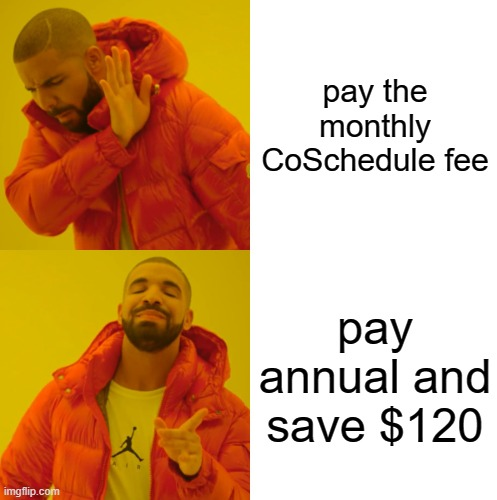
CoSchedule's Marketing Calendar Pricing
CoSchedule’s marketing calendar costs $39 for the monthly plan. When you pay for a full year, you get a 20% discount. This translates to $29 per month and is the better choice.
The editorial calendar takes a maximum number of 10 users and social profiles. Does your business need more social profiles? Get 5 extra at $15 a month.
CoSchedule’s Marketing Suite Pricing
CoSchedule does not have a set price for its marketing suite. Pricing is bespoke and based on your specific needs.
To access the added benefits (apart from the content calendar) such as:
- automated team workflows
- asset and file storage
- marketing request management
- tracking your team's progress
- sorting your calendar by team
...you have to contact the sales team to receive a demo.
How Do I Get Started With CoSchedule?
Here’s the process—so you don’t spend hours figuring out the software. I’ve covered the basic things you may likely use CoSchedule for in this section.
The very first step to marketing workflow bliss (literally) is logging on to www.coschedule.com. When you get there, click on the big orange-colored button that says “Try for free now” or some other similar variation.
You'll be directed to the sign-up page where you’ll create your account. The sign-up form contains just 5 rows. Type in your full name, email address, company name, website URL, and password. Pretty easy.
All check?
Click the big pink button that says “get started now”
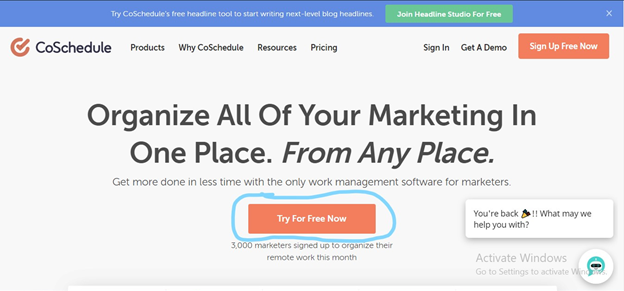
Next is the onboarding process.
Which I think is one of the most extensive I’ve seen on a SaaS platform.
They literally hold your hands every step of the way and don’t stop till you’ve got it all right.
You’ll see different page pop-ups like the one in the screenshot below.
Read through.
Keep clicking on the “next” button until you’re done with the introductory walkthrough.
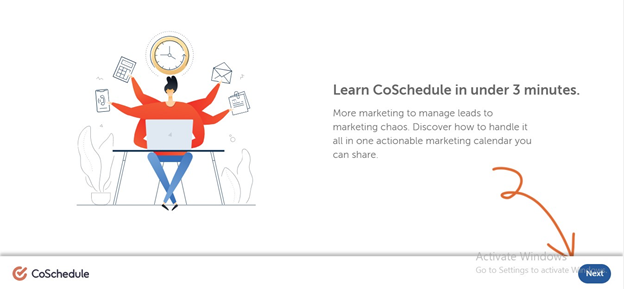
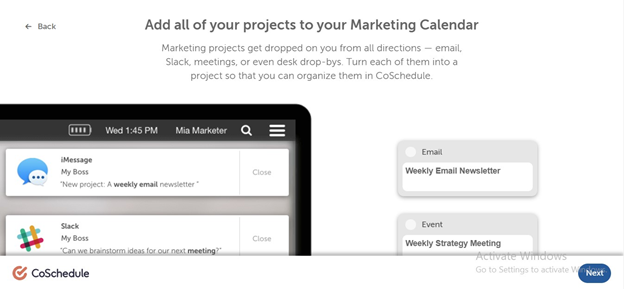
So you’re done with the initial onboarding stage.
By now, you should be looking at a blank calendar page. Rather similar to your traditional digital calendar.
Click on any day to allocate an activity to it.
The two basic categories of events are “projects” and “social campaigns”.
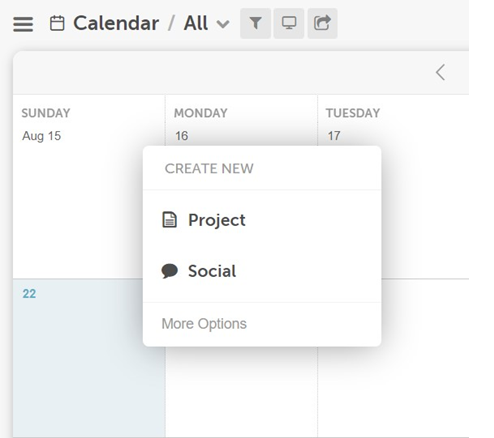
To access more features, such as tasks, notes, and bulk social uploads, click on “more options”
The dropdown menu will expand and look like the screenshot below.
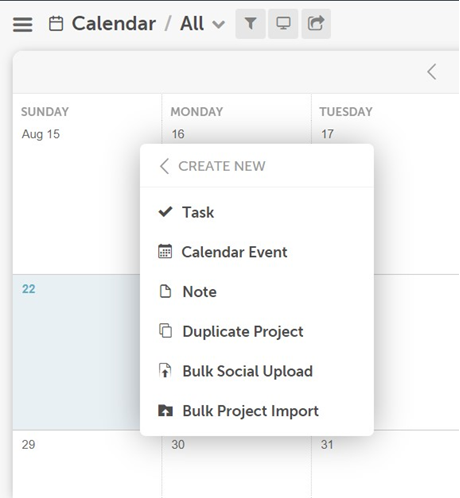
Time to create a project. Pop some champagne, someone!
So I simply clicked on “project”.
When you do the same, you'll see a pop-up identical to the one below.
Click on the “blog post” icon. Scroll through the options to select the particular project type you’re working on.
There are templates for email marketing, newsletters, articles, etc.
Each project type will direct you to a different page, specially made for it.
Fill in the name of your project, description, tags, and color labels.
Click on “create project”
Note: Every detail can be edited later
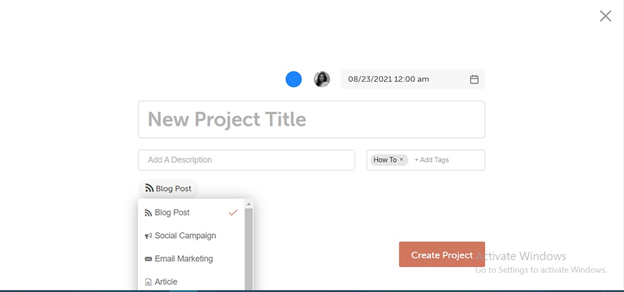
The screenshot below is how your next view should look like. This is where you plug in all the details of your project.
At the right-hand corner, you’ll see a “Tasks” section.
Alongside it are the headings, “discussion” and “contributors”.
This is where the collaboration happens.
Break down your project into small chunks, assign each piece to the individual responsible.
The tasks are in a checklist format so you and your teammates can easily tick off completed work.
Taking up the larger portion of the screen is where you add the most vital attachments.
Below, I have already clicked on the Google Docs icon. Create a new doc right from the app. Title it and edit.
Everything syncs effortlessly so all your work is saved and can be accessed directly from Google docs in the future.
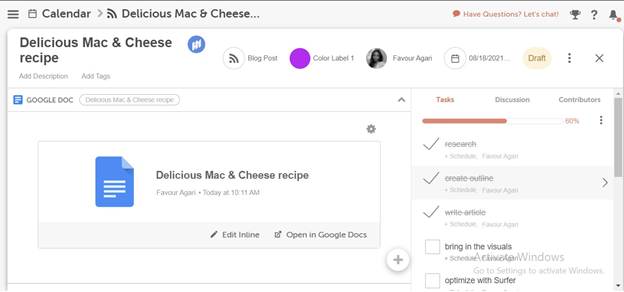
The interface below is what you see when you select “email marketing” as your “project” type.
CoSchedule comes with an “Email Subject Line Tester” that gives you a score from 1-100 based on scientific data.
What I find really helpful is, you don't just get a score.
With every headline you enter, you get personalized, data-backed recommendations on how to improve your email click-through rates (CTR).
Keep making changes till your score and email subject line are good enough for you.
Over 50 is ideal.
Pro tip: Tools aren't 100% accurate. If a headline feels right but has a lower score, use it anyway.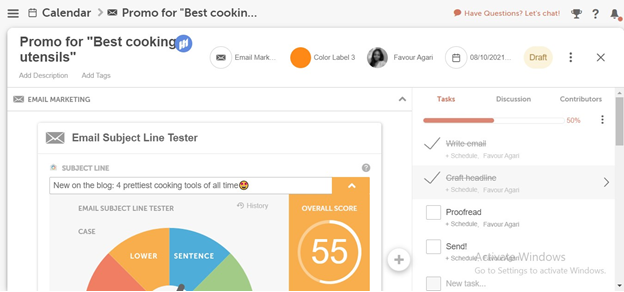
Another important feature is the “Ideas” section.
Here, you can store projects that are not yet scheduled.
They stay out of the main dashboard but can be easily accessed by tapping on the ash-colored “Ideas” button. Right next to the red-colored one that says “Create”.
This brings a lot of flexibility into planning your projects.
It also helps to know what is certain and what needs some more consideration to be fully fleshed out.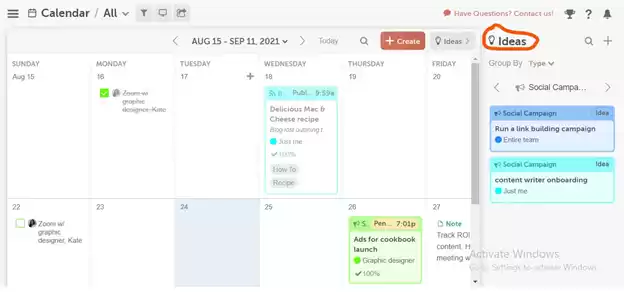
The last thing is the homepage.
Here you have a summary of your onboarding progress.
This is further simplified with the use of indicator colors (green and red) and a percentage.
Complete every milestone to get to 100%.
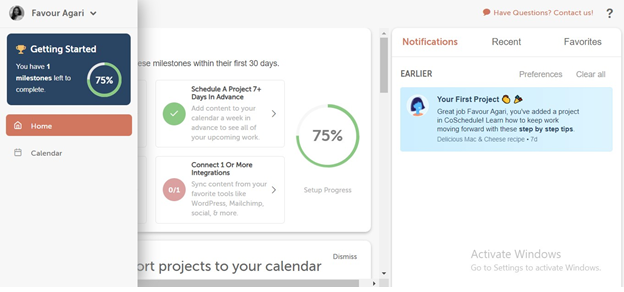
CoSchedule Review F.A.Q’s
If you’re still on the fence somehow, let’s take you off.
Is CoSchedule Worth the Price?
Yes. CoSchedule is worth it if you need an easy solution to manage all of your content marketing activities. It is best for marketing managers with teams, revenue-generating bloggers, and solopreneurs who want to feel like they have a crew behind them.
What Does CoSchedule Do?
CoSchedule is an online tool that helps you plan, monitor, and execute content projects with a clear-cut and streamlined approach. Use CoSchedule to plan social media content, blog posts, and email campaigns.
Does CoSchedule Have a Free Version?
Yes. CoSchedule has a free version.
How Much Does the CoSchedule Marketing Suite Cost?
CoSchedule’s marketing suite does not come at a fixed price. Contact sales for tailored pricing. An interactive ROI calculator can be found on the service page to help you make your decision


 Table of Content
Table of Content









